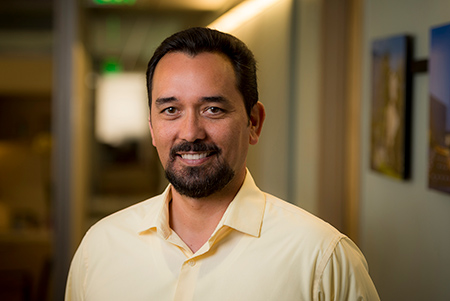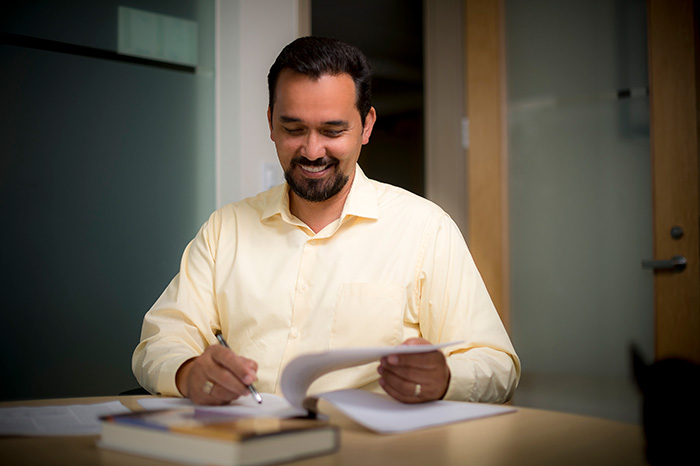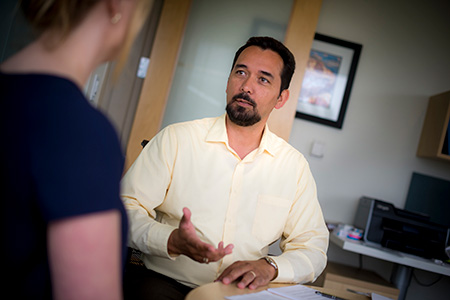“Impressed by Our Transformation:” A Q&A with Rubén Flores, Director of Commercialization
Published Date
By:
- Paul K. Mueller
Share This:
Article Content

Rubén Flores, Ph.D., is the Director of Commercialization in UC San Diego’s Office of Innovation and Commercialization. Announcing his appointment in March of this year, Vice Chancellor for Research Sandra Brown said that he exemplifies the high-achieving entrepreneurial spirit necessary for new discoveries and new solutions. “Rubén has worked in industry and in academia, and thoroughly understands the challenges of managing our patents and licenses, and guiding the new generation of startups,” Brown said. “His guidance and counsel will be invaluable as UC San Diego dramatically boosts our efforts to encourage faculty and student entrepreneurial innovation.”
What does a Director of Commercialization do?
My role is to work across various groups on campus to grow our campus into a thriving entrepreneurial ecosystem by providing opportunities to accelerate the social and economic impact of our research.
To accomplish this goal our team uses many tools, including:
- The ability to file for, obtain patents and license them for commercial use.
- Educating our faculty and students on the various aspects of commercialization.
- Supporting the various campus incubators and entrepreneurial programs.
- Facilitating partnerships with commercial, non-profit and other organizations external to the campus which wish to support our commercialization efforts.
My role is to inspire our team to maximize the positive impact they can have on campus by providing the tools they need to succeed.
The role involves significant outreach activities, establishing and managing partnerships, as well as reviewing and revamping the internal operations and tools we have to achieve our goals.
What’s your impression of UC San Diego’s “innovation ecosystem” now that you’ve had a chance to see it work?
I am very impressed by the transformation the campus has seen in the past few years towards an open and accessible platform for anyone interested in exploring innovation and commercialization avenues.
There are many vibrant programs on campus to support innovation, such as Jacob’s Corporate Affiliates Program, the Qualcomm incubator, Rady School of Management’s entrepreneurial programs, and The Basement.
And we have launched our Entrepreneurs in Residence Program, an Innovation Institute, a Commercialization Assessment Panel and several other programs aimed at providing tools and resources for the campus community -- as well as anyone outside the campus who wishes to explore commercialization.
It is important to acknowledge that the efforts we are developing to support innovation and commercialization are an additional tool to enhance success for entrepreneur-minded individuals, and not a mandate for the entire campus.
At the same time, it is worth noting that the existence of entrepreneurial programs at Stanford, Columbia and MIT does not reduce their ability to remain top-notch basic-research academic centers.

Can you point to a recent success that exemplifies OIC’s new way of doing business?
There are many successes we can highlight. Several of our Entrepreneurs in Residence are in the process of helping our investigators start new companies in the diagnostic and engineering areas. We recently launched a new pilot program to provide a heavily discounted up-front license agreement to start-ups with no qualified investment. And we had the first social-entrepreneur-focused seminar on campus to highlight “for benefit” corporations.
Prior to joining UC San Diego, what similar kinds of successes did you find most challenging or satisfying?
I enjoy taking on complex problems with many stakeholders and navigating a project to completion. Either as a technology scout for large companies, or as a Vice-President for Business Development for a non-profit research Institute, a common challenge is the varying degrees of understanding that individuals from different backgrounds have on a particular issue.
Bridging gaps in knowledge and perspective are key to success in our business. The most satisfying aspect of our function is to see a successful collaboration or license completed first; and then to see a product or service brought to market to address a public need.
You earned a Ph.D. in chemistry and biochemistry at UCLA. How does that academic and scientific background apply to commercializing university technology?
My technical background is a very important platform upon which years of business training have provided me with a unique perspective of the commercialization process. I am very fortunate in that I have played roles in R&D, marketing, operations, FDA product approvals, alliance management, and technology scouting in my prior organizations.
In our office, all of the licensing officers have a business background in a commercial organization setting, which allows them to see both the academic and commercial side of commercializing a new technology.

If an enterprising student walked into your office today, with a good idea for a product or service, what would you advise him or her to do first?
First, I would help her get in touch with our IP attorneys to explore the merits of the idea and the possibility of generating any defensible set of patent claims. At the same time, I would advise her to work with a mentor and or business team at our various entrepreneurial programs on campus mentioned above or EvoNexus, CONNECT, or BIOCOM to get a realistic understanding of who the potential customers are, and the market size for the product or service.
Looking down the road five years, what milestones or achievements do you hope to have achieved by then?
I would like, in part through our efforts, for UC San Diego to be seen as a world leader in innovation and commercialization by engaging productively with our surrounding business community and inspiring our students and faculty.
What product or service would you like to see invented at UC San Diego?
Trying to predict future innovation is challenging. We don’t know how market forces and scientific areas of interest interact in the long run to generate useful innovations.
We can focus on creating strong programs that increase our shots on goal and make use of our areas of strength at UC San Diego. Our campus is strong in engineering, software development, bioengineering, life sciences, data analysis -- but you can never predict where the next breakthrough innovation could come from.
That dynamic unpredictability is what keeps this interesting.
Share This:
You May Also Like
Stay in the Know
Keep up with all the latest from UC San Diego. Subscribe to the newsletter today.



